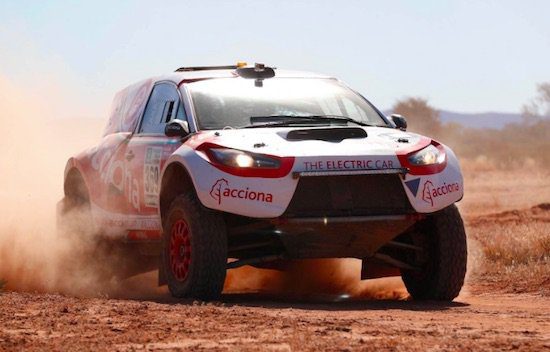Painted as “The Ultimate Desert Race’, the Finke Desert Race is a gruelling 226km, 2-day competition that starts out in Alice Springs, with hundreds of cars and motorcycles hurtling across the desert to the Apatula community (previously Finke) and back again.
Putting electric vehicle technology to the test this year was the Acciona 100% EcoPowered car, the first ever zero-emissions vehicle to go up against fuel-driven opponents in the annual Queen’s Birthday weekend rally.
The car, which is powered by 8 lithium batteries to drive a 250kW synchronous electric motor, was driven by Dakar Rally veteran Andrea Peterhansel from Germany, and co-driver/ quad bike champion Emma Clair from France.
A 100W solar panel on the roof of the car keeps the car’s electronics, like GPS, running without additional drain on the batteries.
Despite 10 years experience driving the Dakar, racing an electric vehicle in the Australian desert terrain provided challenges for the pair, who had to keep an eye on the consumption of energy throughout the race.
One of the ways in which the car normally maintains charge is by way of regenerative braking technology– a special braking pedal recharges the battery by converting the kinetic energy stored in the moving wheels back into chemical energy stored in the batteries.
The car’s onboard display allows the driving team to monitor energy consumption throughout the race.
Peterhansel explained that it meant she needed to change her driving style to maintain charge.
“We are not able to accelerate 100 per cent, like in Australia, you call it ‘pedal to the metal’ because this is using so much energy,” she told the ABC.
The learning curve to drive the car efficiently meant that the pair had to stop in the first stage to recharge the battery for long enough to finish the race.
With a maximum range of somewhere over 200km depending on conditions, the team’s first-day strategy involved stopping for a 45-minute recharge of the lithium batteries.
However, due to certain race regulations that mean cars in the rear of the pack need to pull out as the following motorcycles approach, to maintain a safe distance between the two packs, the vital minutes spent on the recharge meant the Acciona car was timed out and not able to finish the first day’s course.
Day 2 saw Peterhansel and Clair take a different approach, and they made the decision to change driving style and push the limits of the car’s range.
It was a decision that paid off – they successfully finished the second stage – also 226kms – within the time limit, without needing to stop for a recharge, and had a little left in the battery too.
“We learned a lot from day one, and used that knowledge and experience on the second day,” said co-pilot Emma Clair.
“It was a big decision to try the whole stage back to Alice Springs without a recharge, as we knew the distance involved would really test not just the battery’s capacity, but our driving strategy and how we managed the vehicle. It worked though, and we were so happy to cross the finishing line – it was such a great moment.”
While the Acciona EV didn’t come in at the front of the pack as it was competing against specialist desert buggies, completion of the second stage on a course hitherto unknown to the drivers, under the limitations of both the car’s power source and the race itself, shows the advances that renewable driving technologies have made.
Peterhansel and Clair were supported by technical and sporting director Ariel Jatón, as well as a crew and support truck who were flown in for the event. Jatón previously made rally history by finishing the 9,200km Dakar Rally in the ACCIONA 100% EcoPowered car last year.
“It was great to be here in Australia for this wonderful race,” said Andrea Peterhansel, the car’s pilot.
“It was like nothing else we have ever experienced, and the number of people on the side of the road cheering on the cars was incredible. The course itself was lots of fun to drive, and we really enjoyed the challenge of this terrain and the hot, dusty conditions.”

Bridie Schmidt is associate editor for The Driven, sister site of Renew Economy. She has been writing about electric vehicles since 2018, and has a keen interest in the role that zero-emissions transport has to play in sustainability. She has participated in podcasts such as Download This Show with Marc Fennell and Shirtloads of Science with Karl Kruszelnicki and is co-organiser of the Northern Rivers Electric Vehicle Forum. Bridie also owns a Tesla Model Y and has it available for hire on evee.com.au.

